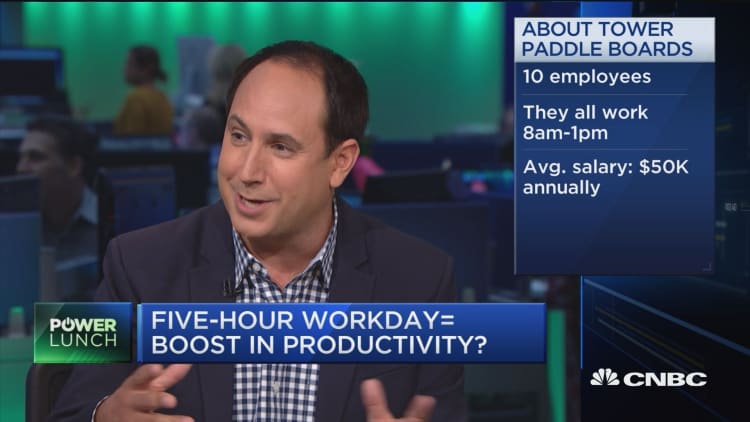Imagine only working five hours a day, and still receiving the same pay as if you had worked an eight-hour day.
That's exactly what one entrepreneur is doing for his employees, and he said it's making his workers happy and helping his business grow.
"I'm giving them this sort of lifestyle where their work week is better than most people's vacation week, but the ask is, 'You need to figure out how to be productive,'" said Stephan Aarstol, founder and CEO of Tower Paddle Boards.
That means while the hours are shorter, the workload is the same.
'Lazy workforce'
He instituted the five-hour workday about a year and a half ago. Employees work from 8 a.m. until 1 p.m., without a lunch break, for a total of 25 hours a week.
The average American works about 44 hours in a typical week, according to a Gallup poll conducted in August.
But a longer day doesn't necessarily mean more work will get done, Aarstol said in a recent interview with CNBC's "Power Lunch." He theorized that most Americans get about two to three hours of work done in an eight- to 10-hour day.
"There's no time constraints on people so we've become a lazy workforce," he added.
While his employees have greater pressure to get their work done, they are not only happier but more productive, said Aarstol, who has also written a book on the subject called "The Five Hour Workday."
He also isn't micromanaging that productivity.
"We measure productivity in really broad strokes, like how much money did we make this year," he said.
Aarstol founded Tower Paddle Boards in 2010, but things really took off in 2012. That's when he appeared on "Shark Tank," and Mark Cuban invested $150,000 for a 30 percent stake in the company.
At the time, the beach and lifestyle retailer had $100,000 in lifetime sales.
"I'm known infamously as the worst pitch in the history of 'Shark Thank,' and I still got a deal. … I froze up, I couldn't talk," Aarstol said.
Cuban's bet has paid off. Since his investment, the company has done over $20 million in sales. Aarstol said Cuban has probably made a 500 percent return on his investment in cash dividends alone over the past four years.
Ellen Galinksy, president and co-founder of the Families and Work Institute applauded Aarstol's creativity.
"It is really important to be creative and to respond to the needs of workers and to say the industrial era models we've had in our heads just don't work," she told CNBC. "There should be more experiments like that."
Over the past 11 years, there has been an increase in flexibility around full-time work — like being able to change starting and ending times and working from home, Galinsky pointed out.
However, when it comes to time away from work — like working reduced hours — there has been a decrease in flexibility by employers, she added.
Disclosure: CNBC owns the exclusive off-network cable rights to "Shark Tank."



